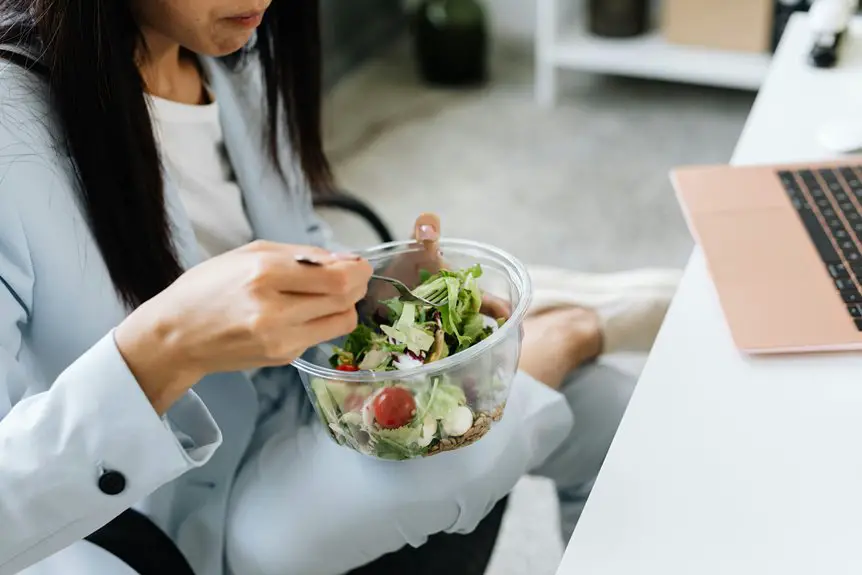Taking a lunch break is essential for boosting your afternoon productivity. It gives your brain a chance to recharge, improving your focus and creativity. A nourishing meal keeps your energy stable, preventing that pesky post-lunch slump. Stepping away from your desk also helps reduce stress and fosters connections with colleagues. Incorporating light physical activity or a change of scenery can spark new ideas and insights. Discover how to maximize your lunch break for peak performance!
Table of Contents
Key Takeaways
- Taking a lunch break allows the brain to recharge, enhancing cognitive function and focus for afternoon tasks.
- Nutritious meals stabilize blood sugar levels, preventing energy slumps and promoting sustained concentration.
- Stepping away from work fosters creativity and new insights, boosting innovative problem-solving.
- Physical movement during breaks increases alertness and reduces stress, improving overall productivity.
- Engaging with colleagues during lunch fosters connections, reducing isolation and enhancing morale.
The Science Behind Taking Breaks
Taking breaks isn’t just a nice idea; it’s backed by science. Studies show that taking short breaks during work boosts your focus and productivity. When you step away from your tasks, you give your brain a chance to recharge, improving your overall cognitive function. This mental reset helps reduce fatigue and enhances your creativity, allowing you to approach challenges with fresh eyes.
Additionally, breaks can lower stress levels and prevent burnout. When you regularly pause, you allow your mind to process information and retain it better.
Benefits of Nourishing Your Body
When you nourish your body during lunch, you not only satisfy your hunger but also fuel your afternoon productivity. Eating a balanced meal has several benefits that enhance your performance at work.
Here are three key advantages:
- Sustained Energy: A nutritious lunch helps maintain stable blood sugar levels, preventing that post-lunch slump.
- Improved Focus: Proper nutrition supports cognitive function, allowing you to concentrate better on tasks and make decisions more effectively.
- Enhanced Mood: Consuming healthy foods can boost your mood, making you feel more positive and engaged throughout the afternoon.
Mental Rejuvenation and Creativity
As you break for lunch, you’re not just refueling your body; you’re also giving your mind a chance to refresh and spark creativity.
Stepping away from your workspace allows your thoughts to wander, fostering new ideas. When you engage in light conversation or enjoy a meal away from your desk, your brain shifts gears.
This mental break can lead to unexpected insights and innovative solutions to challenges you might be facing. Studies show that diverse environments can enhance creative thinking, so consider taking a walk or exploring new surroundings during your lunch.
Improved Focus and Reduced Stress
By stepping away from your desk for lunch, you can greatly enhance your focus and reduce stress. Taking a break allows you to recharge, which is vital for maintaining productivity.
Here’s how a lunch break can help:
- Mental Reset: Shifting your focus away from work gives your brain a chance to relax, making it easier to tackle tasks post-lunch with renewed energy.
- Physical Movement: Getting up and moving around, even briefly, helps to increase blood circulation, leading to improved alertness and concentration.
- Social Interaction: Engaging with colleagues during lunch fosters connection, alleviating feelings of isolation and stress that can accumulate throughout the workday.
Embrace your lunch break; it’s an indispensable tool for heightened focus and reduced stress.
Strategies for an Effective Lunch Break
To make the most of your lunch break, consider incorporating a few simple strategies that can enhance your overall experience.
First, step away from your work area. A change of scenery helps clear your mind.
Step away from your workspace; a fresh environment can refresh your perspective and invigorate your thoughts.
Next, prioritize nutritious foods; they fuel your body and keep your energy levels stable.
Engage in light physical activity, like a brisk walk, to boost your mood and circulation.
If possible, take a moment for mindfulness or deep breathing exercises to reduce stress.
Finally, connect with a colleague or friend, as social interaction can elevate your spirits.
Frequently Asked Questions
How Long Should a Lunch Break Ideally Last?
A lunch break should ideally last between 30 to 60 minutes. This gives you enough time to recharge without losing focus. You’ll feel refreshed and ready to tackle your afternoon tasks with renewed energy.
What Types of Food Are Best for Lunch?
For lunch, you should focus on balanced meals that include lean proteins, whole grains, and plenty of vegetables. Avoid heavy, greasy foods, as they can make you sluggish and less productive in the afternoon.
Can Skipping Lunch Affect My Health?
Yes, skipping lunch can negatively affect your health. You might experience fatigue, decreased concentration, and irritability. Proper nutrition during the day fuels your body and mind, helping you maintain energy and focus in the afternoon.
Should I Work During My Lunch Break?
You shouldn’t work during your lunch break. Taking that time to recharge boosts your energy and focus. Instead of pushing through, enjoy a meal, relax, and return to your tasks refreshed and ready to go.
Is It Better to Eat Alone or With Colleagues?
It depends on your preference. Eating alone can offer quiet reflection, while dining with colleagues fosters camaraderie and teamwork. Consider what you need that day—solitude for recharge or connection for collaboration. Choose what feels right!




